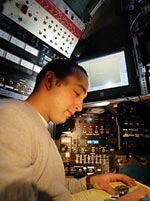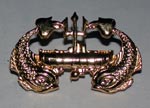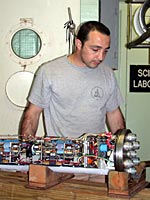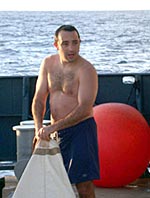|
|
Interviews: Alvin
Pilot Anthony Tarantino
Question:
Aside from baseball, what else were you into as a kid? Anthony: All my toys came together. Actually, they all came apart –I’m not sure they came together. Hands-on was my speed. It came naturally to me. Question: Where did you go to college? Anthony: My parents are great, and I owe them a lot. They put me through school. I went to Wentworth Institute of Technology and got my degree in electrical engineering. After graduating, I worked for seven years at two engineering firms. Question: How did Alvin enter the picture? Anthony:
Sounds easy—I’m just kidding. What is the Alvin Pilot training program like? What skills do you need? Anthony: It helps if you have an engineering background, because the sub is very complex. You start off as an Alvin technician, and your job is basically to help out and do as much as you can. In the meantime, you’re looking and listening, gathering as much information as possible and trying to learn about how the day-to-day operations go, as well as what makes the sub work. The first couple of months you’re here, you’re feeling it out. Question: What do you mean by “you’re feeling it out”? Anthony: The lifestyle. This job has a few unusual features. Being out here for eight months of the year. Dealing with the fact that the people you work with are the people you live with and the people you play with, is another big factor. Being away from your family for so long. I don’t have a house or an apartment. I have my stuff in my sister’s house in boxes. When I’m on vacation, I’m either traveling or bumming a room in my sister’s house, or even my parents’ house. So it’s a nomadic lifestyle. None of us is married. It can be very difficult to hold a relationship.
Assuming you like the lifestyle, what happens next? Anthony: Well, while you’re trying to decide whether you fit into the program, the Alvin Group is doing the same thing with you. If you’ve proven yourself, one day they come up to you, and they say, “We’ve talked about it, and we think you’re ready. You’re a PIT now.” Question: A PIT? Anthony: Pilot-in-training. You start doing pilot-in-training dives. Every fifth dive, there’s a pilot-in-training dive. A PIT will go down with a pilot and one observer. We accomplish the day’s science mission, and at the same time, train our pilots. There’s no simulator. There’s really no other way to learn. I made 16 PIT dives before I made it to pilot. Some people have more. Question: What are the next steps? Anthony: There’s a checklist of systems on Alvin that you have to learn. There are probably 200 electrical, electronic, and mechanical systems—from the system that scrubs out carbon dioxide from the air in the sphere to the variable ballast system that allows you to control the sub’s buoyancy. You have to be able to draw a mechanical diagram of each system and know it thoroughly. Then you have to go in front of a pilot and display your knowledge of each system—how it works, why it works, and how to maintain it. Once you’ve completed all the systems, you begin the process. Question: The process is just beginning? Anthony: The process includes four oral examinations. The first one is with three to five scientists, who ask you about safety and about your ability to complete scientific dive objectives. After that, you have a review board with all the Alvin pilots on board. You stand in front of a whiteboard, and everyone else sits around the table, asking you questions. They’ll say, “OK, draw the VB system.” You draw it out, and then they start asking you all sorts of questions about it. I think I was in there two days, for 4-5 hours at a time. That was tough. Question: And then? Anthony: After that, there are two more reviews. They send you back to Woods Hole, and you have the same type of oral examination with the deep-submergence engineers back at the office. These are the guys who know all the technical bits about the sub that you might deal with on a daily basis. They expect you to have dug into them and know them. They just grill you. These guys have been around for years. They know the history of Alvin, and they expect you to know that, too. They’ll ask questions like “Why is this Alvin system the way it is?”
Once you get past that, you still have one more hurdle to jump? Anthony: You have to go before a Navy review board. You get sent to the Navy’s deep-submergence facility in San Diego and sit down in front of an admiral and a group of submarine captains, and they grill you on a bunch of situations as well. Once you get past them, you’re blessed, and you get to dive. You’ve earned your Navy deep-submergence dolphins (an insignia pin), and you’ve made it. You do your first solo dive, and it’s fantastic, and you get out of the sub, and they dump a bunch of goop on you. Question: Is there a big celebration? Anthony: When you get into port after the cruise is done, it’s traditional for the new pilot to throw a party for everyone on board. I did mine in Manzanillo, Mexico, and it was a load of fun. You get roasted by the guys. They give you gag gifts. That was less than a month ago. I’m fresh. I’ve only had four solo dives. Question: Alvin pilots also maintain the sub, right? Anthony: A submarine is not something you can put on the shelf, dust off and use. It requires a lot more daily maintenance than a car! Sometimes things do go wrong and need repair. Our goal is to make sure the sub is 100% at all times. It means a lot of long nights every now and then. And it means sometimes when you have two or three days in port, you’re just not going to get a day off. I’ve been out to sea for three months with only one day off. Question: Beyond diving, what else do you like about the job? Anthony: I’ve gotten to see some really great places, met tons of interesting people. I’m doing a job that’s interesting, and it means something. Question: You must feel special to be an Alvin pilot. Anthony: I don’t look at us as special. We’re ordinary people doing an extraordinary job. In my opinion, all the pilots are super-competent in the sub. We’ve all gone through the same path, and the guys who make it are definitely solid. You’re looking at a bunch of guys who rely on each other. I’d place my life in any of their hands. Not to make it sound too dramatic because the sub is very solid, but you don’t want to be the guy to make a mistake that keeps the sub from coming up. Everyone knows that. We’re constantly working hard to make sure that sub comes back up to the surface. |
||||||||||||
Mailing List | Feedback | Glossary | For Teachers | About Us | Contact
© 2010 Dive and Discover™. Dive and Discover™ is a registered trademark of
Woods
Hole Oceanographic Institution

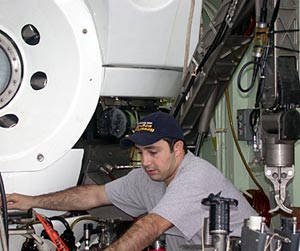 Before
a dive, Anthony checks all the equipment in Alvin’s basket
to make sure it is secure and that he will be able to reach everything
with the manipulator arms.
Before
a dive, Anthony checks all the equipment in Alvin’s basket
to make sure it is secure and that he will be able to reach everything
with the manipulator arms.